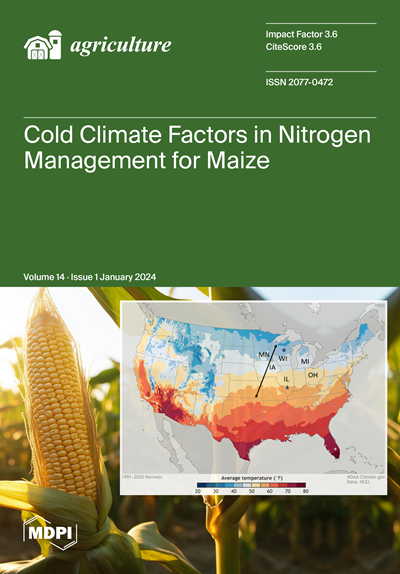Augmentation of Performance, Carcass Trait, Biochemical Profile and Lipid Metabolism Concerning the Use of Organic Acidifier in Broiler Chickens
IF 3.6
2区 农林科学
Q1 AGRONOMY
引用次数: 1
Abstract
This study aimed to disclose the effects of a new compound organic acidifier mixing with L-malic acid and L-lactic acid on broiler production. A total of 1000 1-day-old Arbor acres broiler chicks were randomly divided into two treatments of 10 replicates each, with 50 birds per replicate. The feeding trial lasted for 42 days. The treatment group was offered 0.8% of the acidifier based on the control. The growth performance of the broiler chickens was improved by treatment. The broiler chickens in treatment had lower triglyceride but higher high-density lipoprotein content in serum. Superoxide dismutase activity, total antioxidant capacity and the concentrations of immunoglobulin A, complement 3 and lysozyme were increased in the serum of the broiler chickens, while the concentrations of interleukin-2 and tumor necrosis factor-α in the mucosa of jejunum were decreased by treatment. The expressions of AMPK, CD36, FABP1, MTTP and PPARα were increased but expressions of APOB100 and PCSK9 were decreased by treatment. In conclusion, the acidifier was effective at promoting broiler production, which was probably through the improved immunity, antioxidant and hepatic lipid metabolism capacities. The acidifier may be accelerating lipid metabolism in broiler chicken liver through regulating the expression of the genes related to fat metabolism.有机酸化剂对肉鸡生产性能、胴体性状、生化指标和脂质代谢的影响
本研究旨在揭示l -苹果酸和l -乳酸复合有机酸化剂对肉鸡生产的影响。试验选用1000只1日龄爱拔益加肉仔鸡,随机分为2个处理,每处理10个重复,每个重复50只鸡。试验期42 d。治疗组在对照组的基础上给予0.8%的酸化剂。处理后肉鸡的生长性能得到改善。处理组肉鸡血清中甘油三酯含量降低,高密度脂蛋白含量升高。处理后肉鸡血清超氧化物歧化酶活性、总抗氧化能力以及免疫球蛋白A、补体3和溶菌酶浓度均升高,空肠黏膜白细胞介素-2和肿瘤坏死因子-α浓度降低。AMPK、CD36、FABP1、MTTP和PPARα的表达增加,而APOB100和PCSK9的表达降低。由此可见,酸化剂对肉鸡产量的促进作用可能是通过提高肉鸡免疫力、抗氧化能力和肝脏脂质代谢能力来实现的。酸化剂可能通过调节脂肪代谢相关基因的表达来加速肉仔鸡肝脏的脂质代谢。
本文章由计算机程序翻译,如有差异,请以英文原文为准。
求助全文
约1分钟内获得全文
求助全文
来源期刊

Agriculture-Basel
Agricultural and Biological Sciences-Food Science
CiteScore
4.90
自引率
13.90%
发文量
1793
审稿时长
11 weeks
期刊介绍:
Agriculture (ISSN 2077-0472) is an international and cross-disciplinary scholarly and scientific open access journal on the science of cultivating the soil, growing, harvesting crops, and raising livestock. We will aim to look at production, processing, marketing and use of foods, fibers, plants and animals. The journal Agriculturewill publish reviews, regular research papers, communications and short notes, and there is no restriction on the length of the papers. Our aim is to encourage scientists to publish their experimental and theoretical research in as much detail as possible. Full experimental and/or methodical details must be provided for research articles.
 求助内容:
求助内容: 应助结果提醒方式:
应助结果提醒方式:


